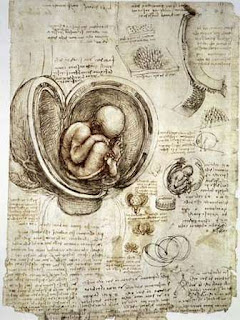Leonardo Da
Vinci is famous for the tremendous progress he made for mankind by dissecting
humans and creating accurate portraits. He was obviously an artist who happened
to be intrigued by the human body, and chose to take on the role of a
scientist. His fascination with the human body provided us with valuable
information about human anatomy and accelerated the growth of a more scientific
field of medicine. Although Da Vinci created his anatomically correct paintings
and drawings before his death in 1519, he is not considered to be the father of
human anatomy. Andreas Vesalius, as Prof. Vessna mentioned, is considered to be
the father of human anatomy. This is because Vesalius published a remarkably accurate
anatomy text, De Humani Corporis Fabrica Libri Septem, in 1543 that provided notes,
in addition to drawings, on human anatomy.
 |
| Da Vinci's drawing of a fetus from 1510 |
 |
| Drawings in Andreas Vesalius' De Humani Corporis Fabrica Libri Septum, published in 1543 |
I found
Orlan’s surgical performances to be rather disturbing. Her point is interesting
however. It truly shows that our idea of beauty evolves over time. Not only
that, it also shows that beauty from those eras does not match with our current
standards of beauty. Her work also illustrates just how much medicine
technology has advanced in the past few centuries. These advances have led to
the birth of plastic surgery, allowing us to live our idea of beauty instead of
just painting it. This also brings an interesting point with regards to the
Hippocratic Oath. Are plastic surgeons following that oath when they perform
surgeries that are not medically required? I personally believe that
Hippocratic Oath is outdated because it leaves out the medical professionals
like the plastic surgeons.
 |
| Orlan during one of her performance surgeries. |
Bibliography
Frank, Priscilla. ORLAN Talks Plastic Surgery,
Beauty Standards And Giving Her Fat To Madonna. 29 January 2013. Web. 26
April 2018. https://www.huffingtonpost.com/2013/01/29/performance-artist-orlan-interview-beauty-surgery_n_2526077.html
Heydenreich, Ludwig Heinrich. Leonardo da Vinci:
Italian Artist, Engineer, and Scientist. n.d. Web. 26 April 2018. https://www.britannica.com/biography/Leonardo-da-Vinci/Anatomical-studies-and-drawings.
Jeffries, Stuart. Orlan's Art of Sex and surgery.
1 July 2009. Web. 26 April 2018. https://www.theguardian.com/artanddesign/2009/jul/01/orlan-performance-artist-carnal-art
Nickson, Chris. Leonardo Da Vinci first Anatomist.
19 July 2014. Web. 29 April 2018. https://lifeinthefastlane.com/leonardo-da-vinci-first-anatomist/
Tyson, Peter. The Hippocratic Oath Today. 27
March 2001. Web. 26 April 2018. http://www.pbs.org/wgbh/nova/body/hippocratic-oath-today.html.
Images:
Frank, Priscilla. ORLAN Talks Plastic Surgery, Beauty Standards And Giving Her Fat To Madonna. 29 January 2013. Web. 26 April 2018. https://www.huffingtonpost.com/2013/01/29/performance-artist-orlan-interview-beauty-surgery_n_2526077.html
Heydenreich, Ludwig Heinrich. Leonardo da Vinci: Italian Artist, Engineer, and Scientist. n.d. Web. 26 April 2018. https://www.britannica.com/biography/Leonardo-da-Vinci/Anatomical-studies-and-drawings.
Vesalius, Andreas. British Library. De Humani Corporis
Fabrica Libri Septem. Basel, 1543. Web. 29 April 2018. https://www.facsimilefinder.com/facsimiles/andreas-vesalius-de-humani-corporis-fabrica-facsimile
It's interesting to see how art and science intertwine when it comes to learning about the human body. In the early times, as you mentioned, medical practitioners had to rely on artists to give them visual representations of human physiology. Depending on how much the artist could visually see impacted how detailed the depiction would be. In this case, we see medicine and art working hand-in-hand to understand the human condition. Nowadays, we have sophisticated medical imaging that takes the burden off the viewer from trying to distinguish internal organs of the body. It's surprising to see how far we have come!
ReplyDelete